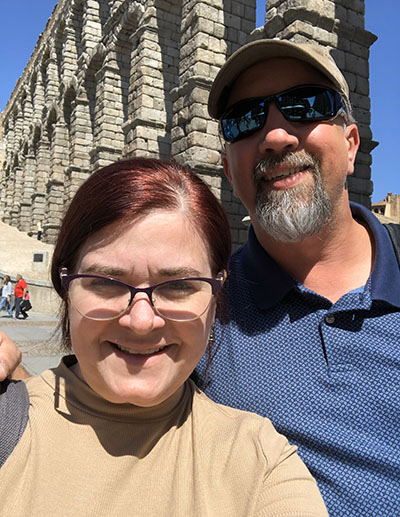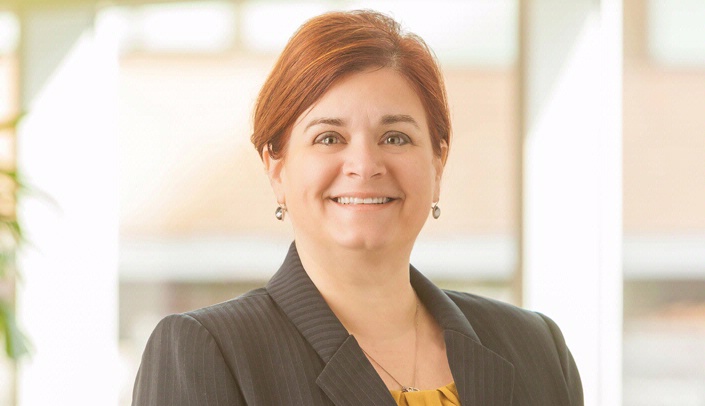Below, Corrigan McBride, MD, professor and chief of minimally invasive surgery and bariatric surgery in the UNMC Department of Surgery, shares her story.
I had a case from my first year as an attending that I learned a great deal from and I have shared with several residents over the years.
It was my first bad outcome, and ultimately the patient died after a long ICU stay.
 |
Corrigan McBride, MD, and her husband, Jerald Aguilar, on vacation |
It was hard on many levels. As a resident and fellow, I thought I had good relationships with patients and family, but none of it prepared me for the level of responsibility and relationship I had have as an attending. The experience was hard because it was long and drawn out, and I didn’t know how to step away. I rounded every day because I felt responsible. I didn’t know how to ask for help.
There were several things that ultimately saved me. I had great partners, and I don’t know that I still would be a bariatric surgeon if Dr. Jon Thompson had not stood in my doorway every day, told me that I was doing the right thing and let me talk through the case. He finally made me leave town and take my scheduled vacation. I had almost cancelled it, because I couldn’t imagine how I would leave, but I did.
When the patient ultimately expired, it sent me into a tailspin, and I had to get help. Dr. Wendy Grant recommended I see someone, and I found a counselor. The counselor had me work on what we would now call “self-care” because I had let so much slide. That is when I finally got someone to clean my house and do my laundry. I started scheduling vacations. I got my haircut. I got a massage. I planned dinners with my girl surgeon group.
Then, two years later the family sued me. The first thing risk management and the lawyers told me was that I couldn’t talk to anyone about the case. It was in this pretrial phase that I met my future husband. It was so hard to be in the wonderful first stages of a relationship yet have this part of my life that I couldn’t talk about or share because of legal advice.
The case took two years to go through the legal process, and I felt completely alone with no one to talk to. There were meetings with my lawyer, and I had to re-read the medical records over and over again. There were the depositions, where they ask you hundreds of questions. Then, you have to read all the depositions. The worst was reading the widow’s deposition, where she talked about how horrible her life was without her husband, and the kids talking about how their kids don’t have a grandfather anymore. Ultimately, there was a trial, and the wife went up on the stand and said in court that there were days in the hospital when I never came by and saw him or rounded.
Luckily for me, one of the sons went against the rest of the family and said he remembered me coming by every day, and even calling and updating him when he had to go out of town on business trips. One of the best days of my life was when the jury found for me. They agreed that I had done nothing wrong.
I had been having nightmares from the day I was served through the jury trial, but even when the jury found in my favor, they didn’t stop. I didn’t know that I could ask for help, because my lawyer said that I couldn’t talk to anyone. But once the verdict was done, I could finally get help. I went back to the therapist and got the help I needed. I know I saw that patient every day. I know I talked to the family every day. I know I did everything I could, and I followed his wishes for his health care, but it helped discussing this with someone.
In the end, I choose to look at these four years as a learning experience and remind myself that they were in shock the entire time in the ICU, and if the family doesn’t remember seeing me, perhaps it’s because the experience was just too difficult.
When I reflect back, there were several important lessons I learned. The most important takeaway was that you have to have supportive partners — people you trust so you can take care of yourself. Then, you actually have to take care of yourself outside of the hospital, especially when nothing seems to be going well in the hospital. I had to learn to become a better documenter and document every family interaction I have so there is a record. I had to learn to ask for help. I had to learn how to share my life with my future husband, even when I couldn’t talk about all of it. But the best lesson was that having a loving supportive partner can make the worst times survivable.
Ten years after the lawsuit, I got a letter from one of the sons saying he knew I was a good doctor and apologizing, but I still think about this case.

Thanks for your courage in sharing this very challenging period of your life and career with us Dr. McBride. It is an important reminder for health care providers that we all need each other and also need to take care of ourselves, especially during tumultuous times.
What a powerful story of pain and healing. Thank you for sharing.
Important story. You are brave to tell it. Thank you.
Thank you for sharing this amazing story. It reminds me to take care of myself so that I may care for others.
Thank you Dr. McBride! Wow- thanks for sharing.
Dr. McBride, our UNMC/ Nebraska Medicine community is fortunate to have you. Thank you for sharing your story.
A very important contribution to our medical community… Thank you Dr. McBride
Thank you for sharing your story. It was very touching and a great reminder to reach out to those around us and take care of ourselves first so we can care for others.
So sorry that you went through this! Glad you asked for the help you needed, and learned to care for yourself. Thank you for your courage in sharing this story.
Thank you for sharing your story.
Thanks Dr. McBride! I watched a family member go through a similar circumstance and with a similar legal outcome. I don't think many realize how hard this is on physicians, especially when they have executed good medicine. Thanks for sharing your story.
Thank you so much for sharing this Dr. McBride.
Thank you for sharing your story. May it be a support to others who might be going through similar experiences.
Dr. McBride, thank you so much for sharing.
Thank you so much for sharing this story so openly, Dr. McBride.
The irony here is that communication about a malpractice suit with one's own physician or mental heath counselor ought to fall under physician-patient privilege. I don't understand the "don't talk to anyone" admonition.
Thanks for your courageous vulnerability and humanity, Dr. McBride!